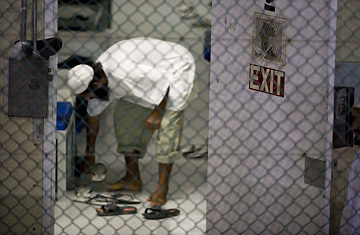
A Guantánamo detainee looks for his sandals in the doorway of his cell after waking up for morning prayer in the Camp 4 detention facility on the U.S. Naval Base in Guantánamo Bay, Cuba
President-elect Barack Obama has pledged to close down the U.S. detention facility at Guantánamo Bay, which has long been a stain on America's global image in respect to human rights and the rule of law. But closing Guantánamo is more easily said than done, so the incoming Administration will be grateful for last week's offer of help from Europe. Portugal has written to the U.S. offering to resettle up to 60 Guantánamo inmates who are not considered security risks, and Portuguese Foreign Minister Luís Amado wrote to his European counterparts urging them to join his country's effort to help the U.S. close down Guantánamo. "The time has come for the European Union to step forward," Amado said in his letter. "We should send a clear signal of our willingness to help the U.S. government in that regard, namely through the resettlement of detainees."
The Portuguese offer applies to captives deemed harmless but who can't be sent back to their home countries, which include Algeria, Tunisia, China, Libya and Uzbekistan, because they may face torture and other abuses there. Some 100 Yemenis will soon be sent home and put into a program aimed at rehabilitating jihadist militants, and the U.S. will have to find its own way to resolve the fate of those detainees it wants to keep under lock and key, possibly bringing them to the U.S. mainland to face trial. But what to do with the 60 detainees deemed harmless yet vulnerable to persecution in their home countries has been one of the knottiest problems in closing down Guantánamo. (See pictures from inside Guantánamo.)
"Until now, it was not obvious how to resolve Guantánamo," says Tomas Valasek, director of foreign policy and defense at the London-based Centre for European Reform. "The Portuguese initiative neatly allows the U.S. to tie up the loose ends. It's brilliant: it allows the U.S. to do something it had always wanted it to do. It also makes the E.U. look proactive, showing it is not just waiting for the Obama Administration to come in and set the pace."
Amnesty International hailed the Portuguese offer as an important step forward in Europe's relationship with the U.S. on human rights. "It helps to end the ordeal of those unlawfully held, but also the international human rights scandal that is Guantánamo," says Daniel Gorevan, who heads Amnesty's Counter Terror with Justice campaign. "The E.U. can now exert a really positive influence as the new Administration tries to clear up the mess not just of Guantánamo but of the other related issues like torture and rendition."
Although President George W. Bush has repeatedly said he wants to shut the Guantánamo camp, he reportedly turned down a proposal by Defense Secretary Robert Gates to bring the detainees to the U.S. And five years of cajoling European nations to take in detainees has had little success — only Albania had responded until now, accepting five Muslim Uighurs from China's Xinjiang region in 2006.
Portugal's offer to accept detainees who are facing no charges and deemed to pose no risk could be matched by similar offers from Britain, France and Germany early next year. These detainees would be rehabilitated and reintroduced to society, although they are likely to remain under surveillance during the initial resettlement period.
So what has motivated the Europeans to suddenly step forward? "This new European interest is undoubtedly motivated by a desire to work closely with the new Obama Administration," says State Department legal adviser John Bellinger. "It's a courageous step by the Portuguese, however. It's a recognition that governments cannot complain year after year that Guantánamo must close yet not be part of the international solution."
Portugal is getting no promises of American assistance for its offer, and there are lingering questions over Portuguese public opinion on accepting detainees. But Anthony Dworkin, senior policy fellow at the European Council on Foreign Relations, says it sets the tone for what the E.U. hopes will be a fresh start once Obama takes office. "It is a symbol of Europe's eagerness to clean the slate and forge a different relationship," he says. But the price of European cooperation will be the expectation that from now on the U.S. fight terrorism on the basis of international rules and norms rather than on the unilateral improvisations that created the Guantánamo problem in the first place.
